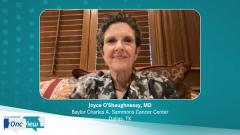
The HER2-Positive Breast Cancer Landscape
Joyce O’Shaughnessy, MD shares an overview of the HER2-positive breast cancer landscape, focusing on prognosis and risk of recurrence for patients with early-stage and metastatic breast cancer.
Joyce O’Shaughnessy, MD: Hi, I'm Joyce O’Shaughnessy from Baylor University Medical Center, Texas Oncology, and US Oncology in Dallas, Texas. It's a pleasure to talk to you today about treatment options for HER2-positive breast cancer, both early stage and metastatic.
For patients with early-stage HER2-positive breast cancer, the goals of care are cure, essentially. We want to increase their chances of basically eradicating the HER2-positive breast cancer as much as possible. Prognosis is really excellent for early-stage HER2-positive breast cancer with patients having the opportunity to remain disease-free approaching 90% in many of our most recent clinical trials. There's a lot of success with early-stage HER2-positive breast cancer. For metastatic HER2-positive breast cancer, unfortunately, we don't have curative therapy for the vast majority of patients. Metastatic HER2-positive breast cancer basically falls into two categories, those who have de novo metastatic disease and those who have recurrent disease. Those who have recurrent HER2-positive metastatic breast cancer, having already been treated with HER2 base therapies and chemotherapy endocrine therapy in the curative setting, they have a worse prognosis than patients who present with de novo metastatic HER2-positive breast cancer, where they have had no therapy prior to their first-line therapy. The patients with de novo metastatic disease will have a very good outcome. Generally, their median survival is in the five-year range or so. Interestingly, there's a group of patients that even at 10 years and beyond still remain disease-free. Now, these patients usually need to keep going on anti-HER2-based therapy in order for the disease not to recur. They need we think lifelong therapy to stay without evidence of disease. We all have patients in our practice that are many, many years out now, even several decades, a couple of decades out from their diagnosis of de novo metastatic disease. This can also occur for patients who have recurrent disease, but they didn't receive prior anti-HER2-based therapy. It's something about getting the very first therapy directed against HER2 in the metastatic setting where a proportion of those patients will go into a complete response and will stay there requiring ongoing therapy for the most part for their life but will stay without progression. Patients whose metastatic disease recurs having already received anti-HER2-directed therapy in the curative setting, they also definitely benefit from anti-HER2-based therapy, but their median survival is shorter than if they had not had prior anti-HER2-directed therapy or early-stage disease.
With regard to assessing a woman's risk of developing metastatic recurrent HER2-positive breast cancer when she first presents with early-stage HER2-positive breast cancer, the factors that predict for recurrence are very similar for HER2-positive breast cancer as they are for other subtypes of breast cancer, mainly nodal status. Node-positive disease and higher degrees of node positivity increase the risk for recurrence as does tumor size. Then higher grade disease increases risk of recurrence. Then the degree to which the breast cancer is actually HER2-driven also makes a difference. For example, we know when you give preoperative HER2-based therapy along with chemotherapy and look at the incidents of a pathologic complete response so having no cancer left in breast and lymph nodes, breast cancers that are estrogen receptor-negative that tend to have higher HER2 gene copy. More HER2 protein there really strongly three plus, these are the patients that have the highest chances of having a pathologic complete response which translates into [00:06:00] a higher degree of having been cured of the breast cancer. We know there's a pretty tight correlation between a pathological complete response and being cured. It's not a hundred percent correlation, but it definitely increases the chances, whereas patients that are triple positive, for example, estrogen receptor-positive, progesterone receptor positive, HER2 positive, in general, those cancers have less HER2 expression, less HER2 gene copies, and those patients don't have as high a pathologic complete response rate. The breast cancer is driven both by the estrogen receptor and HER2 and so they obviously need optimal endocrine therapy as well, but the pathological complete response rate is less in those patients, and they're not as likely to be cured of their breast cancer by chemotherapy and anti-HER2 based therapy. Those are some of the considerations we think through an assessing risk of a newly diagnosed patient.
Newsletter
Stay up to date on recent advances in the multidisciplinary approach to cancer.
































